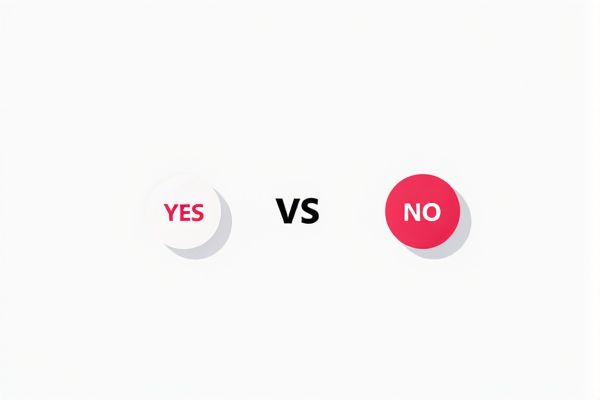
Discover the simplicity of decision-making with our online random choice generator, designed to provide a straightforward yes or no answer whenever you need it. Use this tool to eliminate hesitation, making quick and confident decisions. Enjoy the ease and efficiency of generating unbiased outcomes instantly.
Online tool for random choice generator yes or no
We offer several samples of random choice generators with yes or no options, ready for immediate use and randomization. You can also enter your own custom list for a personalized experience. With a single click, you will receive a randomized list along with one selected value to use.Data Source
Single Result
Multiple Results
Understanding the Concept of a Random Choice Generator
A random choice generator produces unpredictable outcomes by selecting between predefined options, commonly "yes" or "no," using algorithms based on randomness or probability. This tool leverages pseudorandom number generators (PRNGs) to ensure unbiased decision-making in scenarios where human choice might be influenced by cognitive biases. Understanding the underlying mechanism of randomness enhances trust in the generator's fairness and application across fields like gaming, decision support, and psychological experiments.
Key Features of Yes or No Generators
Yes or no generators use algorithms to produce binary outcomes, ensuring unbiased random selections between two options. Key features include simplicity, quick response times, and the ability to customize inputs for personalized decision-making. These tools often incorporate randomness sources such as pseudo-random number generators or entropy-based methods to enhance unpredictability.
Benefits of Using a Yes or No Decision Tool
A yes or no decision tool simplifies complex choices by providing clear, unbiased answers quickly, reducing decision fatigue. It enhances productivity by eliminating hesitation and promoting decisive action, enabling users to focus on execution rather than overanalysis. This tool improves mental clarity and confidence, especially in fast-paced environments where timely decisions are critical.
Common Applications for Random Yes or No Generators
Random yes or no generators play a crucial role in decision-making processes across various fields, including psychology experiments, game development, and customer feedback analysis. These tools help eliminate bias by producing unpredictable answers, facilitating fair and efficient outcomes in A/B testing and user experience research. Their integration in automated systems enhances real-time decision support, improving operational efficiency in diverse applications.
Algorithmic Approaches to Random Selection
Algorithmic approaches to random selection for a yes or no choice often leverage pseudorandom number generators (PRNGs) that produce uniform distributions, ensuring unbiased outcomes. Techniques such as the linear congruential generator (LCG) or Mersenne Twister facilitate efficient random bit generation, which is mapped to binary decisions by threshold comparison. Optimizing these algorithms improves performance and randomness quality in applications ranging from cryptography to game design.
Ensuring Fairness and True Randomness
A random choice generator for yes or no decisions must utilize robust algorithms such as cryptographically secure pseudorandom number generators (CSPRNG) to ensure fairness and true randomness. Implementing entropy sources from hardware random number generators can enhance unpredictability, minimizing bias in outcomes. Continuous statistical testing, like the chi-square test, verifies the uniform distribution of results, maintaining the integrity of the decision-making process.
Popular Online Yes or No Generators
Popular online yes or no generators use advanced algorithms to provide randomized, unbiased decision-making results instantly. These tools often feature simple interfaces and high user engagement, catering to quick binary choices for users across quizzes, surveys, and interactive content. Trusted platforms like Random.org and YesNo.io leverage robust randomization techniques to ensure fairness and reliability in yes or no outcomes.
Integrating Random Choice Tools in Daily Life
Integrating random choice generators for yes or no decisions streamlines everyday problem-solving by providing unbiased, immediate answers in uncertain situations. These tools leverage algorithms to simulate randomness, aiding decision-making in contexts such as scheduling, prioritizing tasks, or resolving minor disputes quickly. Employing random choice generators enhances efficiency by reducing decision fatigue and promoting impartiality in daily routines.
Potential Limitations and Misconceptions
Random choice generators producing "yes" or "no" outcomes may suffer from biases due to poor algorithm design or insufficient entropy sources, leading to predictable patterns. Misconceptions often arise when users assume true randomness and fairness, ignoring potential manipulation or deterministic factors embedded in the code. These limitations emphasize the importance of understanding the underlying mechanism and validating output randomness before relying on such tools for critical decisions.
Future Trends in Random Decision-Making Tools
Future trends in random decision-making tools emphasize enhanced algorithmic precision and integration of AI-driven personalization to improve the reliability of yes or no outcomes. Advancements in quantum computing are expected to elevate the true randomness in choice generators, enabling more secure and unbiased decisions. Increased adoption of these tools in fields like healthcare, finance, and interactive entertainment signals a shift towards automated, data-informed decision processes.
 azrandom.com
azrandom.com